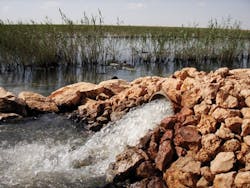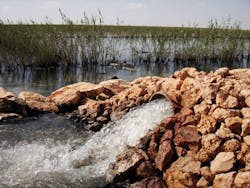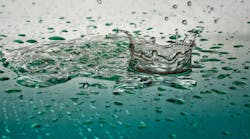Although not renowned for high levels of rainfall, Ethiopia and Tanzania have proven through recent trials that rainwater harvesting can provide a supplementary source of water supply in urban Africa. Tekalign Tsige Sahilu discusses results from the trials and considerations for future rainwater harvesting efforts in Africa.
The world has recognised the growing global water scarcity experienced in many countries. The situation demands improved management of available water resources and promotion of freshwater augmentation technologies. In particular, an increased application of rainwater harvesting technologies has the potential to become an important alternative source of water for domestic water supply and sanitation.
UN-Habitat, the United Nations Programe for Human Settlements, has recognised the need to promote rainwater harvesting in urban areas of Africa. This forms part of the Water Demand Management component of the Water for African Cities programme. Consequently, efforts are underway in several countries to promote this technology.
Demonstration of rainwater harvesting in African urban centers
As part of the Water for African Cities programme, UN-HABITAT and local NGO, Ethiopian Rainwater Harvesting Association (ERHA), together with the government entity known as Zanzibar Water Authority (ZAWA) formed partnerships for the planning and the implementation of a rainwater harvesting pilot project in Ethiopia and Zanzibar respectively.
The pilot programmes were carried out in three cities of Ethiopia (Addis Ababa, Dire Dawa and Harar) and in Zanzibar (Unguja and Pemba islands). Simple techniques such as fero-cement or plastic tanks were used for collecting and storing rainwater from rooftops.
Rainwater harvesting schemes were demonstrated in 13 schools, four community centers and two prisons, reaching over 22,000 clients. A total of 24 rainwater harvesting schemes with the capacity ranging from 5 m3 of plastic tanks to 50 m3 of fero-cement tanks were constructed. Overall water collection capacity of the 24 tanks is estimated to be 550 m3, translating into a per capita yield from rainwater of about 25 litres.
From the point of view of the current practice of water use in the project countries, 25 litres water per capita is sufficient to meet the demand of the residents during the rainy season.
The physical construction of the rainwater harvesting schemes was supported through training and capacity-building activities. Accordingly, training manuals and technical guidelines were developed and promotional and reference materials on relevant topics produced and distributed. Rainwater management committees were formed and trained in regard to operation, maintenance and management of the schemes.
Impacts
One of the most immediate outcomes of the demonstration project was an increase in demand for rainwater harvesting services. This resulted in an initiative taken by the relevant government departments of the participating cities, whom later earmarked a budget for the implementation of rainwater harvesting schemes. Such intervention has also inspired utilities to consider rainwater harvesting as a complementary source of water, particularly Harar and Zanzibar.
In terms of potential long-term impacts, it can be expected that the up-scaling of the programme will enable the use of rainwater as an adequate potential water resource, which has not been properly used so far and previously wasted due to unchecked runoff.
In countries like Zanzibar, the growing water demand will create more pressure on groundwater resources, resulting in increased abstraction of groundwater and hence the intrusion of seawater into groundwater. Therefore, up-scaling rainwater harvesting in Zanzibar will help to reduce reliance on groundwater sources and mitigate against this problem.
In addition, the promotion of rainwater in schools and similar institutions can help to reduce costs either through the reduction of the values of water bills or the saving of electric power that is used to pump water from wells.
Changing perceptions about rainwater quality
So far, water and sanitation policies of many African countries have completely ignored rainwater harvesting as a potential supplementary sources for the urban water supply system. In some cases, rainwater harvesting is used as a suitable technology for rural communities. However, the absence of effective policies for rainwater harvesting as a complementary source of water for domestic use is and will continue to be a challenge for the promotion of the rainwater harvesting programme.
There are also cultural taboos or religious beliefs that have a negative impact on the use of rainwater. A typical case is considering rainwater as having negative effects on the health of women (as encountered in Zanzibar).Also the practice of not paying for water or getting water from the system free of charge may not encourage people to look for an alternative source. In Zanzibar, residents were used to not paying for water for a long time, which can considered as one of the factors hindering the wide-spread use of rainwater in the country.
At the individual household level, promoting rainwater collection can also be constrained by the fact that the installation costs of the technology can be relatively higher than that of the cost of constructing a private line to the network system. Generally, there is always a concern about the quality of rainwater. Therefore, there is a lack of full confidence to tell residents to use rainwater for drinking purposes.
The storage capacity of rainwater tanks remains a concern when considering water needs over a long duration of time. During the implementation process of the programme, it was also observed that the design of some school buildings is not suitable for the installation of rainwater harvesting facilities.
Rainwater for secondary needs
To make the promotion of rainwater harvesting effective, the demonstration of the physical work has to be combined with awareness raising, educating the public and facilitating stakeholders' networking.
The rainwater harvesting system has been found to be practically suitable for elderly and disabled people who do not have private water connections nearby their homes. Since these residents are not able to walk long distances to fetch water, they need a technology that fulfills the "water without walking" principle. Therefore, rainwater harvesting is a highly suitable technology especially for elderly and disabled people.
Unlike groundwater extraction, the use of rooftop rainwater harvesting does not require energy or an electric power supply. This represents an economic and social benefit to a country like Zanzibar where the electric power supply is a scarce resource with substantial opportunity costs.
Potential savings can also be made by installing rainwater harvesting systems in large buildings such as schools due to their larger roof areas and their high demand for non-potable water. Intended to augment water demand management in urban areas, urban rainwater harvesting might not necessary be considered for potable purposes.
However, its suitability for other, secondary needs like laundry, sanitation, gardening, car washing, toilet flushing and personal sanitation can substantially reduce the use of treated (pipe water) otherwise consumed for those purposes.
Emergency response to water demand
Promotion of urban rainwater harvesting can tangibly contribute to water demand management and represents a sustainable approach to water supply. The rainwater harvesting demonstration project can be regarded as a rapid emergency response to the critical situation of countries like Zanzibar, particularly from the point of view of the water supply crisis suffered due to power interruption.
Unfortunately cultural taboos or religious beliefs can still have a negative impact on use of rainwater. In some cases there is a belief that rainwater can have a negative effect on the health of women
Providing schools with rainwater harvesting schemes improves hygiene and sanitation conditions and the implementation through schools has proved to be effective in reaching the community at large. It is also easer to show the economic benefit of using soft water (rainwater) than hard water (groundwater) since it is associated with lower consumption of detergents or cleaning substances.
Recommendations
The promotion of rainwater as an alternative source to address the need of urban domestic supply requires a suitable environment and buildings, as well as different development companies to oversee projects and interest at local, national, regional and international levels. Recommendations for future rainwater harvesting projects include:
a) Policy, strategy and programmes:
- Promote or facilitate dialogue with national governments to address rainwater harvesting in their policies
- Integrate rainwater harvesting mechanisms in schools and community development programmes
- Encourage utilities to incorporate rainwater harvesting in existing programme activities.
b) Community participation:
- Involve the community and other stakeholders from the inception phase.
c) Up-Scaling:
- Extend support for demonstration of rainwater harvesting through available financial resources for follow-up investments
- Increase the capacity of storage tanks to accommodate sufficient water that can last for a longer period of time
- Integrate demonstration programmes in other areas like health, community and religious centers.
d) Research and capacity-building:
- Facilitate platforms for sharing experiences and learning about best practices from others in the region
- Study and implement direct and indirect incentives to be provided for communities/institutions/households with rainwater harvesting
- Explore technologies that can be easily adapted to the local situations of African cities and ensure the quality of the rainwater
- Carry out cost-benefit analysis to show the comparative advantage of the technology over the others
- Establish financing mechanisms that will take into account the willingness and ability of the urban poor to pay for services
- Supporting the initiative through training and capacity building activities
- Supporting research on rainwater quality, quantity, affordability and sustainability. WWi
Author's note: Tekalign Tsige Sahilu is from UN-Habitat and is the regional technical advisor of water for the African Cities programme (Anglophone countries). He is an economist by profession and has more than 20 years experiences in the water and sanitation sector of African Countries. email: [email protected]
More Water & WasteWater International Archives Issue Articles




